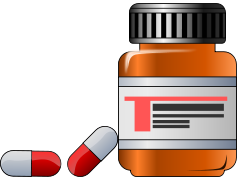Imagine a person that develops an acute problem that requires hospitalization and even a time in the ICU. Serious but something that modern medical care can deal with and cure. Until …the patient now develops an unexpected serious infection and despite excellent and appropriate medical care, dies. Unfortunately this scenario is all too common in today’s hospitals.
Imagine a person that develops an acute problem that requires hospitalization and even a time in the ICU. Serious but something that modern medical care can deal with and cure. Until …the patient now develops an unexpected serious infection and despite excellent and appropriate medical care, dies. Unfortunately this scenario is all too common in today’s hospitals.
More than 100,000 Americans die each year from hospital acquired infections; that is the infection developed only after admission to the hospital. Many more develop and yet the patient survives. The cost to the healthcare system is immense – $6 to 7 billion per year! Many are caused by bacteria that are resistant to our most important antibiotics. So prevention is critical.
The antibiotic resistant bacteria are not new news but we often don’t appreciate how serious the problem really can be. The use of new antibiotics, especially very broad spectrum antibiotics, creates the setting for a resistant bacteria to multiply and a healthcare setting like a hospital or a long term care facility (LTCF) creates the chance for patient to patient transmission.
Some bacteria like “staph” (Staphylococcus aureus) have become resistant to the most effective agents, especially penicillin derivatives such as methicillin and hence the term we are familiar with called methicillin resistant Staphylococcus aureus or MRSA. At least one drug, vancomycin, is usually still effective although it must be administered intravenously.
Another problem is what’s known as “carbapenem-resistant Klebsiella pneumoniae” (CRKP). These bacteria have become rather frequent causes of serious hospital acquired infections. Carbapenems are very powerful antibiotics developed to treat gram negative bacteria like this one. But resistance has developed and when it occurs the resistance is usually to essentially all antibiotics, not just the carbapenems.
Without a means of therapy, the key is to prevent transmission and hence infection. Hand washing and the use of antibacterial lotions are critical. Approaches to reduce contact are important as well. Extensive disinfection of rooms and equipment is a must. And avoiding antibiotics unless truly necessary is essential. There are other critical steps related to each of the common sites of infections – IV line infections, pneumonias, urinary tract infections, post-operative wound infections, etc. Adherence to check lists of evidence-based prevention protocols are key.
The hands of providers are a major route of transmission. Hand washing and antibacterial lotions work but only if used. Hospitals need to enforce the rules and put sanctions that have meaningful teeth in place (such as exclusion fromr the OR or not able to admit patients for a week for the observed second offense — both of which are economic sanctions that get the providers’ attention.) Isolation procedures with gloves, mask, gown and booties are needed in some situations to prevent transmission from room to room, patient to patient.
Even extensive attempts at disinfecting the patients rooms (or ICU cubicle, OR or procedure room) may not be adequate, leaving viable organisms behind. Newer approaches such as room misting with binary ionization of low strength hydrogen peroxide (StereaMist) when used according to protocol can effectively destroy all bacteria, fungi and viruses plus spores such as C difficle. The process is fast (less than ten minutes per room), the material kills on contact, converts to oxygen and water, and the room is immediately ready for the next patient. SteraMist is relatively new so this is not an endorsement but it may be worth considering for further due diligence. (Disclosure – I have gotten to know the company, Tomi Environmental Solutions, through some consulting)
Many hospitals now have antibiotic “stewardship” programs designed to assure that broad spectrum antibiotics are used only when absolutely indicated, are discontinued as soon as possible, and are converted to narrower spectrum agents once the causative bacteria is defined. These programs are effective at reducing the use of these agents, thereby reducing the opportunity for resistant organisms to spread and infect patients and have the side benefit of reducing costs quite substantially.
One major issue, often not appreciated, is that patients arrive at the hospital already colonized with resistant bacteria. Residents of long term care facilities (LYCF) are often colonized in part because the individuals may have picked up the bacteria during a recent hospitalization. And spread from person to person in the LTCF setting is relatively commonplace – what with multiple occupancy rooms and common dining and activity areas. Some LTCF residents often have multiple medical conditions and so they are more susceptible than others to having an infection develop, sending them back to the hospital. A sort of vicious cycle is compounded by various underlying chronic illnesses that render the resident more susceptible to infection.
Hospital acquired infections cause many deaths and much suffering in addition to substantially adding to the costs of care. The rise of antibiotic resistant bacteria has now reached critical importance. With few or no antibiotics available now nor on the horizon to treat infected patients, preventing transmission is absolutely essential. This is a lot easier said than done but it can be done and there is no excuse for not doing so.
Post Script: My new book, The Future of Healthcare Delivery – Why It Must Change and How It Will Affect You, has a chapter that discusses this issue in more detail. See www.medicalmegatrends.comfor more information.








